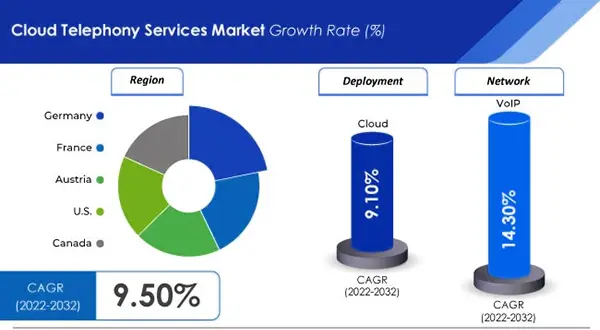Enhancing Communication Management for Businesses with Cloud Telephony Technology
In this business landscape, effective communication is the lifeblood of any successful organization. Traditional phone systems are becoming outdated, and businesses are progressively turning to telephony technology to streamline and enhance their processes.
In this article, you will explore how cloud calling solutions are revolutionizing contact for companies, making them more efficient, flexible, and cost-effective.
Understanding Cloud Calling Solutions
Before delving into the benefits, clarify what this software as a service entails. Cloud calling, also known as cloud telephony or cloud-based phone systems, is a technology that leverages the Internet to manage voice and data transmission. Unlike traditional on-premises phone systems, this software as a service is hosted, providing firms with a range of advantages.
Scalability and Flexibility
One of the standout features of this service is scalability. Businesses can quickly scale their infrastructure up or down based on their needs. If you’re a small startup or a large enterprise, telephony can adapt to your requirements, ensuring that you pay only for what you use.
Cost Savings
Traditional phone systems often come with high upfront costs and ongoing maintenance expenses. It operates on a subscription-based model, reducing initial capital expenditure. Moreover, the cost of calls and international contact is typically lower with these systems, leading to significant savings over time.
Mobility and Remote Work
The modern workforce is mobile, with employees working from various locations. It empowers remote work by enabling employees to place and receive calls from any location with internet connectivity. This flexibility ensures no interruption if employees are in the office or on the go.
Advanced Features and Integration
It provides a diverse array of advanced capabilities, including voicemail-to-email, call forwarding, interactive voice response (IVR) systems, and call analytics. These features enhance functionality and help industries provide a seamless customer experience.
Reliability and Disaster Recovery
These services are hosted in redundant data centers, ensuring high reliability and uptime. In the event of a natural disaster or system failure, telephony allows for swift disaster recovery and business continuity, minimizing disruptions.

The stats above show the data of the cloud telephony services market.
Analytics and Insights
Cloud calling platforms provide detailed call analytics and insights. Businesses can gain valuable data on call volume, call duration, consumer interactions, and more. This data-driven approach enables informed decision-making and helps organizations refine their communication strategies.
Easy Management and Updates
They are easy to manage through user-friendly interfaces. System updates and maintenance are typically handled by the service provider, reducing the burden on internal IT teams. This guarantees that companies can concentrate on their primary activities.
Integration with Existing Systems
These systems can integrate seamlessly with business software and applications like customer relationship management (CRM) systems. This integration streamlines processes and gives a holistic view of consumer interactions.
Security and Compliance
It prioritizes security, offering encryption and robust security measures to protect sensitive communication data. Moreover, these platforms often comply with industry-specific regulations and data privacy laws, ensuring legal compliance.
Enhanced Customer Service
Delivering exceptional customer service hinges on effective transmission. It enables businesses to route calls more efficiently, reduce wait times, and enhance interactions, ultimately leading to higher satisfaction.
Conclusion
In conclusion, cloud telephony technology is a game-changer for businesses looking to optimize their processes. Their scalability, cost savings, mobility, advanced features, reliability, and data-driven insights are reshaping how organizations handle communication.
As organizations evolve and embrace remote work, telephony is becoming indispensable for staying connected with employees, customers, and partners. By adopting cloud-calling solutions, companies can enhance efficiency and gain a competitive edge in the current dynamic marketplace. Embrace the power of telephony and elevate your business to new heights.


